new posts in all blogs
Viewing: Blog Posts Tagged with: Olympics, Most Recent at Top [Help]
Results 26 - 50 of 119
How to use this Page
You are viewing the most recent posts tagged with the words: Olympics in the JacketFlap blog reader. What is a tag? Think of a tag as a keyword or category label. Tags can both help you find posts on JacketFlap.com as well as provide an easy way for you to "remember" and classify posts for later recall. Try adding a tag yourself by clicking "Add a tag" below a post's header. Scroll down through the list of Recent Posts in the left column and click on a post title that sounds interesting. You can view all posts from a specific blog by clicking the Blog name in the right column, or you can click a 'More Posts from this Blog' link in any individual post.

By: Alice,
on 8/31/2012
Blog:
OUPblog
(
Login to Add to MyJacketFlap)
JacketFlap tags:
design,
art,
fashion,
olympics,
graphic design,
Architecture,
symbols,
Olympic Games,
Summer Olympics,
Editor's Picks,
*Featured,
ceremony,
Art & Architecture,
Arts & Leisure,
london 2012,
Design Histories of the Olympic Games,
Jilly Traganou,
Journal of Design History,
modernity,
Pierre De Couberti,
Wolff Olins,
Add a tag
By Jilly Traganou
After attending the “Because” event at the Wolff Olins office on July 4th, I was once again reminded of the big disconnect that lies between designers and their public. Wolff Olins is the firm that designed the London 2012 brand, a multifaceted design campaign that included much more than the London 2012 logo. Readers may remember the numerous complaints that the logo generated. As my research revealed, this was caused partly due to International Olympic Committee (IOC)’s restrictions and the corporate unwillingness to allow for the full application of what might be seen as a “no logo” campaign.
Wolff Olins proposed an open-source framework that would integrate the public by providing a design language that could be shaped into new forms and messages. The designers’ intention was to “hand over some tools that would allow people to make everything they wanted.” Design would be “off the podium, onto the streets.” But neither the public nor the broader designers’ community were ready to accept that the Wolff Olins team showed no compliance to the usual set of corporate instruction and that what they were trying to achieve lied beyond the creation of beautiful forms.

London 2012 event. Photo by Gary Etchell. Used with permission. All rights reserved. http://www.flickr.com/photos/gary8345/557769058/
The designers’ goal was to evoke an effect similar to that of the Mexico 1968 design: a visual language designed by Lance Wyman that was not only appropriated by the counter-Olympic movement, but also marked future visual languages developed by local designers in Mexico. In a way, Wolff Olins’ design succeeded in its adaptability, even though its multiple viral deconstructed versions that appeared on the streets and online were meant to primarily express conspiracy and protest, or even a disdain for the very visual language that the designers provided (and which these “dissidents” are now using).
But why would designers today strive for openness and participation? And why should IOC, London Organising Committee of the Olympic and Paralympic Games (LOCOG), or the general public be indifferent or even hostile to these intentions? After all, are there any designs that would meet the aspirations of all stakeholders: Olympic organizers, designers, and their multiple publics? The Olympics, as indeed most public events, are complex platforms that bring to the surface deep social conflicts and generate heated debates about the notion of public good. The new temporary or permanent configurations that are designed for the Olympics express these tensions and often become the targets of opposing voices.
Everyone today recognizes that the modern Olympics only partly concern sports. Few, though, are aware of the multiplicity of the design engagements that are mobilized for their realization. Being characterized as something between urban festivals and quasi-religious events, the Olympics have a strong ceremonial character that design generates. Hundreds of designers are mobilized to create a series of objects (logos, posters, uniforms, mascots, souvenirs) that are indispensable for the Olympic ensemble. This may seem to some a contemporary distortion to the original 19th century idea of the modern Olympics’ founder, Pierre De Coubertin, but Coubertin was keenly aware of the importance of design for the identity of the Games. He designed what has been credited as the most recognizable logo in the word, the Olympic rings, and spent considerable energy in prescribing the ceremonial characteristics of the event, with writings on subjects that ranged from attention to lighting and decoration, to specifications on the architecture of the venues.
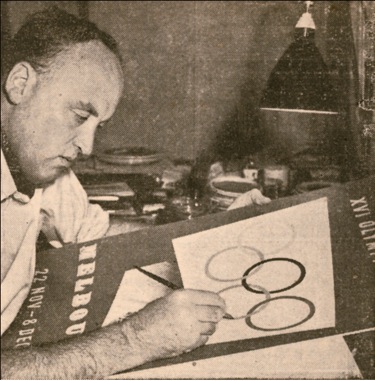
Photograph in newspaper (unspecified) of Richard Beck working on the design for the Olympic poster. This proto-version differs from the final design, particularly in its typography. Collection: Powerhouse Museum, Sydney, 92/1256–1/4. Used with permission.
The design for the Olympics has been an overlooked subject in the fields of design history and Olympic studies alike. Olympic design’s role as an instrument of modernity becomes obvious, for instance, in the way
British athletes’ uniforms were designed for the early Opening Ceremonies, expressing but also helping to shape the identity of modern Britain. The Melbourne 1956 poster designer, Richard Beck,
abandoned the neoclassical body of the male athlete that characterized earlier Olympic posters for a non-figurative composition along the tenets of modern design.
As it has become only too obvious with the current case of London, in late modernity the Olympics are also an opportunity for new infrastructure projects and major real estate enterprise, which leave a debatable legacy to the host-city. Planners, architects, and urbanists play a major role in this process, as well as those who sponsor, lease, or invest in the projects in the longue durée of the post-Olympic era. The design for the Mexico 1968 Olympics had significant ideological implications for the social segregation that marked the future of Mexico City. The architecture of the Athens 2004 Olympics is emblematic of ‘instant monumentality’ and a lack of legacy planning that has characterized many modern Olympics.
At the same time, the high visibility, budget, and scale of the Olympics have provided designers with opportunities to realize ambitions that are not possible through ordinary projects, and to envision ideas that are often too advanced for their times. Katsumi Masaru for instance insisted in compiling a design manual for the Tokyo 1964 Olympic Games (a set of prescriptions that would secure the unified application of the graphics, and thus a cohesive Olympic image), even though he knew too well that it could hardly be applied in the Tokyo Olympics per se. Indeed it was completed just before the start of the Games leaving nevertheless an important legacy for all forthcoming Olympics for which a design manual became a staple. Should we similarly expect that the “no logo” idea of the London 2012, with its openness and lack of corporate compliance, is signaling a new paradigm shift?
Jilly Traganou is Associate Professor in Spatial Design Studies at the School of Art and Design History and Theory, at Parsons The New School for Design in New York. She has published widely in academic journals, has authored The Tokaido Road: Traveling and Representation in Edo and Meiji Japan (Routledge, 2003) and co-edited Travel, Space, Architecture (Ashgate, 2009). She is currently working on a new book Designing the Olympics: (post-) National Identity in the Age of Globalization. Traganou has recently edited a special issue titled “Design Histories of the Olympic Games” for the Journal of Design History, where she also serves as Reviews Editor.
The new issue of the Journal of Design History titled “Design Histories of the Olympic Games” introduces the Olympics as a multifaceted design operation that generates diverse, often conflicting, agendas. Who creates the rhetorical framework of the Olympics, and how is this expressed or reshaped by design? What kind of ambitions do designers realize through their engagement with the Olympics? What overall purposes do the Olympics and their designs serve? ‘The Design Histories of the Olympic Games’ brings together writings by a new generation of scholars that cross the boundaries between traditional disciplines and domains of knowledge. Some of the articles look at the role of Olympic design (fashion design and graphic design) in representing national identity. Other articles look at the interconnected area of architecture, urbanism and infrastructure and the permanent legacy that these leave to the host city. You can view more on the Journal of Design History’s Design Histories of the Olympic Games Pinterest board too.
Subscribe to the OUPblog via email or RSS.
Subscribe to only art and architecture articles on the OUPblog via email or RSS.
Read more blog posts about the London 2012 Summer Olympic Games.

The Olympics are long gone, which is a very good thing for my writing. The nights of endless gymnastics, swimming, beach volleyball, diving, and track may or may not have affected my daily word count (okay, it totally did), but at least a few sports failed to suck me in (I'm looking at you, fencing and water polo). However, there was an upshot to the abnormal amount of time I spent in front of my television--I found tremendous inspiration in every athlete out there. I also noticed similarities between what it takes to be an Olympian and an Olympic writer:
1) Train. Those athletes didn't make it to the Olympics by saying, "I know I have it in me to be an Olympian," and then find excuses about how they didn't have enough time, money, etc. to put in the hours. Using Malcolm Gladwell's 10,000 hours rule (if you haven't read Outliers, you should), these athletes have logged well over 10K hours in training. Michael Phelps should have gills from how much time he's spent underwater. How does an Olympic writer train? Certainly not by saying they know they "have a book in them...someday." They write. Then they write some more. Then what do they do? You get the idea.
2) Be persistent. Not every athlete qualifies for the Olympics on their first try. Those that make it to the Olympics don't always get gold--or medal at all--their first time there. I don't think that's a bad thing, as it can be a powerful motivator. Track star, Allyson Felix, took the silver in the 200m in Beijing. From 2008 until the 2012 Games in London, she trained her ass off and focused on being the very best she could be...and got her gold. Most athletes don't medal, but at least they knew they did the best they could do and were good enough to get to the Olympics. The lesson for writers? Never give up. Keep trying and get better. If your first book doesn't land you an agent or a book deal, keep trying. If you self-publish and the book doesn't sell well, keep trying. Go back to step 1) and push yourself to be the best writer you can be.
3) Hope for a little luck. Yep, even in the Olympic, sometimes winning a medal involves a bit of luck and good timing. I watched a noted BMX racer (yes, I watched BMX too--I told you I watched a lot o' Olympics) go down because of a crash in front of him. One swimmer might hit the touch pad a bit harder than another and get the faster time. Everyone has times when they feel they are "in the groove" and other times when things don't go their way. With the Olympics, athletes have only that one moment, and they better hope they are in the groove. Though not as intense, there is timing and luck involved with publishing too. Even publishers can't always predict which books will be a hit. Sometimes it takes hitting the right publisher, or the right audience, with the right idea at the right time. You don't have control over this, but you do have control over steps 1), 2), and 4), which makes this step more likely to fall into place.
4) Be a good sport. Whether an athlete won gold, bronze, or even nothing at all, most of them carried themselves with grace, poise and humility. Oscar Pitorius, the double amputee track star from South Africa, didn't medal but stood out as an Olympic hero. McKayla Maroney demonstrated great humor over the attention she's received regarding her obvious disappointment at winning silver in the vault. If you haven't checked out the McKayla is Not Impressed page, it's cute (my fave pic is the one of her in the scene at the art museum in Ferris Bueller's Day Off). The lesson for writers? Whether you're a New York Times bestseller, or an aspiring writer trying to get out of the slushpile, treat others with respect and kindness. It doesn't cost anything to be a decent human being, plus I'm a big believer in karma, kismet, and va

By: Maryann Yin,
on 8/20/2012
Blog:
Galley Cat (Mediabistro)
(
Login to Add to MyJacketFlap)
JacketFlap tags:
Eric Simonoff,
Kristin Ostby,
London 2012,
Alex Morgan,
Children's Books,
Deals,
olympics,
Simon & Schuster Books for Young Readers,
Simon & Schuster,
Add a tag
 Fresh from winning a gold medal at London 2012, Olympian Alex Morgan has landed a 3-book deal with Simon & Schuster’s Books for Young Readers (SBYR). The American soccer star will be penning her debut middle-grade series, The Kicks.
Fresh from winning a gold medal at London 2012, Olympian Alex Morgan has landed a 3-book deal with Simon & Schuster’s Books for Young Readers (SBYR). The American soccer star will be penning her debut middle-grade series, The Kicks.
The not-yet-titled first book will be released in Summer 2013. SBYR editor Kristin Ostby negotiated the deal with William Morris Endeavor Entertainment literary agent Eric Simonoff. Ostby, who will edit the manuscript, secured both world English and audio rights.
Morgan (pictured, via) had this statement in the release: “It seems like only yesterday, I was a kid myself, getting my first taste of the joys of teamwork, good sportsmanship, acceptance. Playing team sports is one of the best ways I can think of to develop strong values, good work ethics, and a health-focused lifestyle. This series will no doubt widen the appeal of soccer and bring an appreciation of the sport to readers who might not otherwise have that opportunity.”
New Career Opportunities Daily: The best jobs in media.
The Olympics are over and it's all right to go back to watching ordinary TV. The news returns to workaday-economic-disaster and ice caps melting faster than we thought.
My husband's almost glad: he feared that taekwondo was going to be too steep a learning curve. In 17 days he had mastered the nicities of dressage and dive scoring and came to understand the concentration required in clay shooting. For one brief glorious moment he knew what it meant to be a coxless pair with the taste of victory in your mouth and experienced the thrill of escaping elimination in cycling contests, but he wasn't sure he was going be a good enough spectator for the taekwondo contestants.
As a novice watcher I wasn't so worried, most sport is a mystery to me, but I was transfixed by the stories acted out in front of us in real time each day. I was learning a lot too about crises and climaxes, character development and story arcs.
If you are a writer who wants to write a page-turning unputdownable epic, I recommend watching Mo Farah's 5000 metres race. It was suspense distilled into 13:41.66 minutes.
Here's part of Carol Ann Duffy's take on what we have just lived through. It's got a punch big enough for a boxing gold.
A summer of rain, then a gap in the clouds
and The Queen jumped from the sky
to the cheering crowds.
We speak Shakespeare here,
a hundred tongues, one-voiced; the moon bronze or silver,
sun gold, from Cardiff to Edinburgh
by way of London Town,
on the Giant's Causeway;
we say we want to be who we truly are,
now, we roar it. Welcome to us.
We've had our pockets picked,
the soft, white hands of bankers,
bold as brass, filching our gold, our silver;
we want it back.
We are Mo Farah lifting the 10,000 metres gold.
We want new running-tracks in his name.
For Jessica Ennis, the same; for the Brownlee brothers,
Rutherford, Ohuruogu, Whitlock, Tweddle,
for every medal earned,
we want school playing-fields returned.
And it starts again on August 29 with more heroes and heroines telling more stories...
A PASSION FOR VICTORY: THE STORY OF THE OLYMPICS IN ANCIENT AND EARLY MODERN TIMES, by Benson Bobrick (
Knopf/Random House 2012)(ages 10+). In this year of the XXXth Games of the Modern Era, Benson Bobrick looks back on the history of the Olympics from its origins in ancient Greece to its reawakening in 1896.
Bobrick's accounts of both the ancient and early modern games (up to 1948) is fascinating, filled with anecdotes about athletes the politic of the day. A must-read for anyone interested in how today's Olympics came to be. (And, personally, I wish they would bring back chariot racing.).
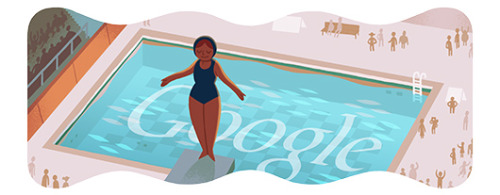
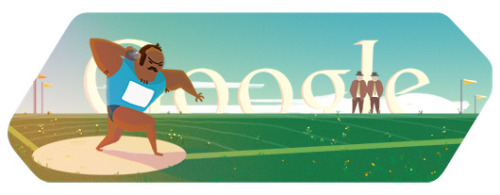
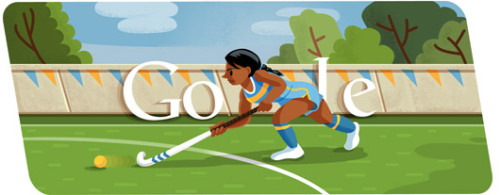
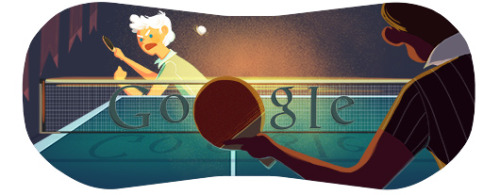
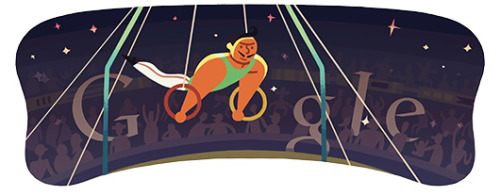
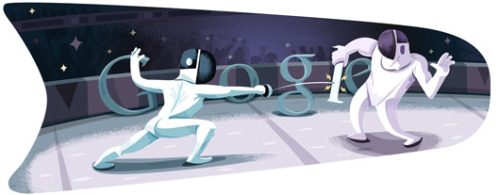
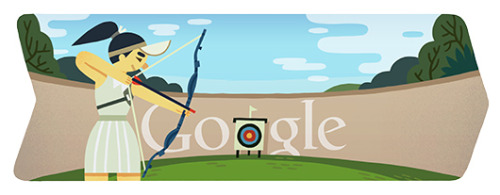
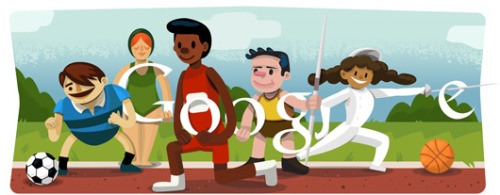
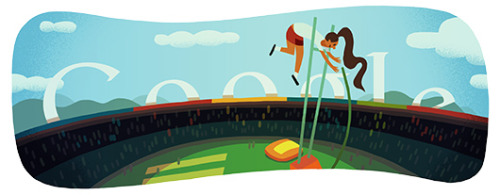
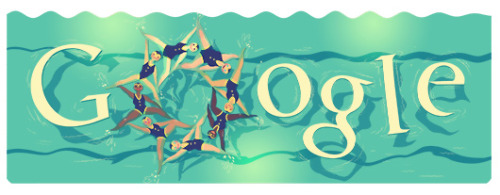
svff:
fuckyeahillustrativeart:
2012 Olympic Google logo illustrations by Sophie Diao
follow Sophie on tumblr!
Hi wow thanks for posting these! I’m so glad people like them! However, I only did the shotput and pingpong doodles - the rest were done by Ryan Germick (opening, fencing, field hockey) and Sophia Foster-Dimino (archery, diving, rings, pole vault) - please head over to their respective blogs and give them some love!
Also hello new followers :D Looking forward to getting to know you all!
Wondering who drew the Google Doodles appearing during the 2012 London Games? They were created by a trio of illustrators: Sophie Diao, Ryan Germick, and Sophia Foster-Dimino, as mentioned in this tweet by Sophia.
I’ll repeat what others have said too: “Hey Google, please credit your illustrators publicly. This isn’t hard to do; magazines, newspapers, and other websites do it all the time.”


By: Beth,
on 8/7/2012
Blog:
YALSA - Young Adult Library Services Association
(
Login to Add to MyJacketFlap)
JacketFlap tags:
teens,
art,
politics,
Research,
Programs,
olympics,
smoking,
Social Media,
prevention,
socializing,
community service,
emerging adults,
Add a tag
Is this what they call the dog days? Not for me! This is my first summer living in Boston instead of Tucson, and I’m soaking up the beautiful high-80s temps they call “hot” around here and spending as much time outside as possible. But I did manage to go inside and find a few interesting tidbits for your personal interest and professional usefulness.
- Have you ever tried to explain to someone why their offhand comment that “that’s gay” offends you? Or been annoyed when you offer to help carry something heavy and you’re refused because you’re female? Maybe someone made a rude joke about Middle Easterners not knowing you are of Saudi descent? These are called “microaggressions,” and the Microaggressions Project, a collective blog made up of submissions from anyone who wants to share an experience of feeling belittled, ignored, or just frustrated, whether because of their religious beliefs, gender identity, race, victim status, or a variety of other factors. Without resorting to hate speech or angry tirades (and no specific names, locations, or other identifying information is in any of the submissions), this blog would not only be a great resource for teens who feel like their voices aren’t being heard, but you could talk with your advisory group and possibly start your own project, with something as easy as index cards and a locked jar or box.
- Do you do any prevention programs in your library regarding tobacco, alcohol, or substance abuse? Not that you aren’t doing a good job, but you might want to think about asking teens themselves to develop an engaging, innovative program. In a paper published in the Journal of Adolescent Health, researchers found that teenagers were most receptive to anti-smoking ads when they were delivered by peers, not adults, and they were more interested in those ads that stressed the lifelong effects of smoking, particularly the negative ones like money spent on packs per week. Maybe sometimes negativity isn’t such a bad thing.
Latimer, A.E., et al. (2012). Targeted smoking cessation messages for adolescents. Journal of Adolescent Health, 50(1): 47-53.
- I hope it isn’t wishful thinking when I propose this next topic for your thousands of patrons who will be coming in in the next few weeks before heading off to college, maybe to return one last pile of books and DVDs or just to say goodbye and thanks to you, their ally. Make sure your collegebound patrons (as well as those who will be entering the workforce or alternative programs) know that reading doesn’t stop after high school. While the publishing industry makes up its mind on whether or not New Adult is a viable new category, plenty of bloggers are gathering resources for writers and readers who want to graduate from YA but not jump straight into books about 40something divorce(e)s. And the Book Report Network, a set of linked book review sites, recently launched 20Something Reads, a special branch dedicated to that same group. Slowly but surely, books are trickling out that deal with post-high school confusion to post-college drama.
- Weeding a bunch of old magazines? Before tossing them in the recycling bin, check out Ben Heine’s Pencil Vs. Camera Project. First, be wowed. Look up and count how many hours you’ve been at your computer. Then consider tearing out interesting pictures from magazines, printing out or Pinning some of your favorites of Heine’s, and encouraging your patrons to do the same. As someone whose stance on fine art is to enjoy but never partake, I recall a similar assignment in fifth grade art class, and I’m so proud of my drawing of deer that I still have it, more than a decade later. There’s somethin
 Olympic Athletes vs. Book Characters: Who Would Win?
Olympic Athletes vs. Book Characters: Who Would Win?
It's Olympics time! We're all abuzz about our favorite athletes and events here at the STACKS, and it got us thinking . . . we should do a Who Would Win post about the Olympic Games!
So we'd like to know . . . who do YOU think would win in a competition?
- Ryan Lochte (American Swimming Olympic gold medalist) vs. Percy Jackson
- Natalia Valeeva (Italian Archery world champion) vs. Katniss Everdeen
- Hagrid vs. Li Xueying (Chinese Weightlifting Olympic gold medalist & Olympic record holder)
- Captain Underpants vs. Lu Chunlong (Chinese Trampoline Olympic gold medalist & 2011 world champion)
- Amy & Dan Cahill vs. Aleksander Lesun (French 2012 World Cup Pentathlon winner)
- The Weasley twins vs. Serena & Venus Williams (American two-time Olympic gold medalists in doubles Tennis)
- Hugo Cabret vs. Gabby Douglas (American Olympic gymnast)
- Slappy the Dummy vs. Aleksey Shemarov (Belarusian 2011 world Wrestling champion)
- Rodrick Heffley vs. Zhang Jike (2011 World Champion and World Cup winner in Table Tennis)
We're curious to hear your answers. Share your thoughts in the Comments below!
— En-Szu, STACKS Intern (a.k.a. MidnightMagic5)
Maggie Beattie Roberts, my section leader for “Tap the Power of Technology and Media to Teach Higher Level Comprehension,” suggested using pop culture references as one way to engage students in minilessons. (Pop… Read More →
 I have been having so much fun watching the Olympics all week! Like last week, I captured some of my favorite moments to share with you, dear STACKERS, and included my official and very serious captions, because the Olympic Games are all about serious competition and intense rivalry.
I have been having so much fun watching the Olympics all week! Like last week, I captured some of my favorite moments to share with you, dear STACKERS, and included my official and very serious captions, because the Olympic Games are all about serious competition and intense rivalry.

Members of the U.S. women's Gymnastics team bite into their chocolate medals after winning the team competition. . . Wait, I've just been informed those are gold medals, not chocolate. Um, somebody should tell the athletes. A girl could break a tooth!

Maxim Rakov and Elmar Gasimov do a little break dancing for the Olympics spectators before their Judo match. Well . . . it's possible that maybe that IS the Judo match.

Tennis player Veronica Cepede Royg practices her Summoning Charm. "Accio tennis racket!" Why the racket was not in her hand to begin with is a mystery though. You'd think she would have just carried it with her to the match.

Members of the Bulgarian Volleyball team play Simon Says in the middle of their game against Australia. . . or acatually, that might be a lie. They might be waiting for a serve or something.

The U.S. women's Rowing team throw their coxswain into the water after winning the women's Eight event. . . Seriously. I'm not making this up. They really threw her in!
The Olympic Games continue for another glorious week! Yay! Leave YOUR captions to these photos in the Comments.


By:
Betsy Bird,
on 8/4/2012
Blog:
A Fuse #8 Production
(
Login to Add to MyJacketFlap)
JacketFlap tags:
Quentin Blake,
Olympics,
goats,
Louise Yates,
Natalie Merchant,
Video Sunday,
Louis CK,
book trailers,
Barbara McClintock,
Clifford the Big Red Dog,
Harry Potter,
Uncategorized,
Add a tag

Finding videos of the Voldemort vs. Mary Poppins nuttiness online was surprisingly difficult. Finally I found a sort of recap of the Olympic 2012 opening ceremonies with reference to the rise of the great children’s literature villains (The Queen of Hearts, a Disney-esque Cruella de Ville, Captain Hook, and Voldemort) and their destruction at the hands of 30 Mary Poppins. “A sweeping rambling narrative” is as accurate an interpretation of what happened as any I could come up with. You’ll see the references at 1:00 in this video.
And since we’re already on the topic of Harry Potter (admittedly we are almost always on that topic) I sure hope you guys had a chance to see the first installment of Harry Potter and the Ten Years Later. I thought it was rather well done. Sort of makes me want to see the whole series now.
Thanks to Boing Boing for the link.
And now for a bloody effective book trailer. If the point of such trailers is to cause the reader an immediate and almost impossible to resist urge to pick up the book and read it, Leave Your Sleep as edited by Natalie Merchant (yes, that Natalie Merchant) now has that hold on me. It does not hurt that the songs featured here, paired with Barbara McClintock’s illustrations, are a delight. A sheer, as they say, delight.
Resist it if you can. And, might I say, this is one of the more logical uses of a celebrity getting involved in children’s literature that I’ve seen. I was seated next to Ms. Merchant at a BEA lunch and to my delight she turned out to be a huge Barbara McClintock fan long before this book. She said this, so I decided to quiz her by asking what she knew. Without missing a beat she rattled off everything from The Gingerbread Man to Adele and Simon to the Aesop’s Fables Ms. McClintock did years ago. Woman knows her stuff.
Okay, gear switch. Obviously if I’m showing a Louis CK video then this is not going to be workplace friendly, though honestly aside from one off-white phrase this is downright pure for Louis. When I read in a recent Entertainment Weekly article that he hated Clifford the Big Red Dog with a passion that eclipses the white hot sun I knew I had to find video proof. Proof I found, and I love how he pairs Clifford with Narnia. If Louis put out a CD that was just children’s book rants . . . okay, that’s a ridiculous dream. But a dream I now have!
And now Louise Yates interviews Quentin Blake. Because I can.
Thanks to Watch. Connect. Read. for the link!
And for the final off-topic video, awwwwww. Baby goats. Manic, remorseless baby goats. Sadly adorable.
Thanks to mom for the link.
It's been exciting, the Olympics - it really has. All those amazing human bodies everywhere you look, doing all those amazing things. But it's important to remember that not all competition is good for us. Let me tell you a story ...
Here’s how it is. I have an older sister. This is not unusual. Many people do. And many people find their older sisters irritating. But no one has an older sister who is as irritating as mine.
Because mine has done everything.
Let me give you an example of how irritating this can be.
When I was about to go to university, my sister came into my room and handed me a nice, leather-bound notebook.
“This is for you,” she said.
“Oh, thanks! Is it a journal, for me to write my experiences with boys and men in?”
“No. It’s a journal in which I’ve written my experiences with boys and men. Read it carefully, and you won’t have to make the same mistakes I did.”
“Oh. Well, what makes you think I won’t make my own, new mistakes?!”
My sister just smiled. “I think you’ll find I’ve already made them all.”
Well, I wasn’t having that. I went off to university and set out to make all the mistakes my sister hadn’t.
I thought, I’ll date my professors – I’ll date my room-mate’s brother – I’ll date the entire football team – I’ll date the janitor … but when I checked, I found that every bad idea I came up with had an entry in my sister’s journal already.
It was when I saw the sign called for recruits for the newly-formed Scottish Historical Re-enactment Group that I realised I’d cracked it!
This she hadn’t done, I was sure!
It turned out the Group consisted of two boys – Trevor (the president) and Greg (the co-president). They were wearing Braveheart wigs and cardboard swords.
“We don’t get a lot of girls,” said Trevor.
“You don’t get any girls,” said Greg.
“Yuckedy yuck. Look who’s talking.”
“At least I’ve had a date!”
“Snogging my cousin when she was unconscious doesn’t count as a date!”
Wow! I thought. This has got to be the best mistake EVER – my sister won’t be able to hold a candle to this!
“Anywho,” said Trevor. “We’d better get started. As you know, Historical Re-enactment Groups strive for absolute accuracy. To that end, we will be performing the Battle of Bannockbuns wearing nothing but our tattoos.”
“What?!” I said.
“In the historical nuddy. You, too, of course, Miss. But don’t worry, it’s not as if we’ll be really naked. Greg and I have painted ourselves with blue runic letters, just to make it decent, and we’d be more than happy to do the same for you, wouldn’t we, Greg? Greg?”
The co-president’s eyes had glazed over in a worrying fashion.
“Never mind him,” said Trevor. “Here, let me show you mine …”
As the president of the Scottish Historical Re-enactment Group began to strip off, I beat a hasty retreat …
I phoned my older sister as soon as I got in, and told her about my experience. I waited for her to say, “Well! Now that’s something that never happened to me!” but I waited in vain.
“Oh yeah. I did that,” came her voice, as smug and superior as ever. “I think you’ll find some pretty clear advice on the whole re-enactment thing, round about page 87. Look it up. Bye!”
No way, I thought to myself. No bloody way. She’s bluffing. She has to be! But she wasn’t. When I turned to page 87, there it was, my older sister’s warning, staring up at me in big, black, undeniable words:
BEWARE GEEKS BARING GLYPHS ...
There are some competitions you are never going to win, and sometimes even taking part is a bad idea. Choose your battles, my friends. Choose your battles. Visit Joan's
website.
Visit Joan's
blog.
 The Closing Ceremony of the Olympic Games will be titled "A Symphony of British Music." While the details of the August 12th spectacle are still being kept super-secret, the organizers have said that they "will work with some of the country's most globally successful musicians, along with some of the industry's stars of tomorrow." There are TONS of rumors flying around – One Direction? Jessie J? QUEEN?
The Closing Ceremony of the Olympic Games will be titled "A Symphony of British Music." While the details of the August 12th spectacle are still being kept super-secret, the organizers have said that they "will work with some of the country's most globally successful musicians, along with some of the industry's stars of tomorrow." There are TONS of rumors flying around – One Direction? Jessie J? QUEEN?
Sounds AWESOME!
Personally, I would be excited to see the John Lennon tribute and Take That's performance of "Rule the World," my favorite song of all time (I really hope The Wanted make an appearance, too; I'm a huge fan)! Darcy Bussell, the famous British ballerina, will be dancing with 300 other members of the Royal Ballet in a grand performance while the Olympic torch is put out. I can't wait for that, either!
So, I want to know. What rumors are you hoping are true? More importantly, what's YOUR dream lineup? Would you have a laser light show, flying acrobats, holograms, colored mist, fireworks? Share your Closing Ceremony wishlist in the Comments below!
— En-Szu, STACKS Intern (a.k.a. MidnightMagic5)
Image courtesy London 2012
Native American Athletes to Compete in the London 2012 Olympics
By Cheryl Cedar Face · 07/27/2012
From: American Indian Report
Indian Country has an extra reason to celebrate today’s opening ceremony of the 2012 Summer Olympics: four Native American women will be competing for a medal in London.
The women are competing one hundred years after Jim Thorpe won two gold medals at the 1912 Stockholm Olympics. If they win, they will join Billy Mills (Oglala Sioux), Duke Kahanamoku (a Native Hawaiian), and Jim Thorpe (Sac and Fox), as Native American medalists.
Mary Killman, a member of the Citizen Band Potawatomi Nation of Oklahoma, will be competing in the Synchronized Duet Technical swimming event. She and her partner Mariya Koroleva qualified by placing 7th at the Federation Internationale de (FINA) Olympic Games Qualification tournament.
Mary Spencer, First Nation Ojibway, will be competing in the 75-kilogram middleweight boxing event for Team Canada in women’s boxing Olympic debut. Spencer has been hailed as one of Canada’s best bets for Olympic gold. According to her official website, Spencer is a three-time world champion and an eight-time national champion.
Tumua Anae, a Native Hawaiian, will be competing as the goalie for the U.S National Water Polo team. She began training with the National Team in 2010. Anae recorded sixteen saves at the 2012 FINA World League Super Final.
Adrienne Lyle, 27, is one of the youngest American dressage riders to compete in the Olympics. Lyle is a citizen of the Cherokee Nation. She earned a place on the American team after placing in the top four at the U.S. Equestrian Federation Dressage Festival of Champions and USEF Dressage Olympic Selection Trials on June 16th.
All four women are distinguished athletes competing not only for their countries, but for their Indigenous nations. Be sure to watch out for their events!
Filed under:
culture,
Diversity Issues Tagged:
American Indianas,
olympics,
women 

It’s Olympics time! Have you all been glued to your televisions and various electronic devices for the last 5 days? Or, conversely, have you been dodging your televisions and electronic devices, trying to avoid spoilers?
Either way, the Olympics are one of my favorite things. And while it’s tons of fun rooting for all the current big names (Michael Phelps! Kerri Walsh! Gabby Douglas!) it’s also worth spending a few minutes remembering some great Olympic athletes from the past who paved the way. Here are three to start with:
 1. Sammy Lee (Sixteen Years in Sixteen Seconds): Diver Sammy Lee was born on August 1, 1920 in Fresno, California. Growing up, Sammy was barred from the public pool six out of seven days of the week because he was not white; despite that, Lee became a world-class diver and at the 1948 Olympic Games in London, became the first Asian American to win a gold medal. There’s a great picture of Sammy Lee, now 91, in this now-and-then piece on athletes from the last London Olympics.
1. Sammy Lee (Sixteen Years in Sixteen Seconds): Diver Sammy Lee was born on August 1, 1920 in Fresno, California. Growing up, Sammy was barred from the public pool six out of seven days of the week because he was not white; despite that, Lee became a world-class diver and at the 1948 Olympic Games in London, became the first Asian American to win a gold medal. There’s a great picture of Sammy Lee, now 91, in this now-and-then piece on athletes from the last London Olympics.
 2. Jim Thorpe (Jim Thorpe’s Bright Path): Jim Thorpe is often described as one of the greatest athletes of the twentieth century. He was born in 1887 to a Pottowatomie mother and Sac/Fox father, and was sent to an Indian boarding school when he was very young. He eventually began playing football and running track under the eye of the famous coach Pop Warner at Carlisle Indian School, and in 1912 won gold medals in the Pentathlon and Decathlon at the summer Olympics in Stockholm, Sweden.
2. Jim Thorpe (Jim Thorpe’s Bright Path): Jim Thorpe is often described as one of the greatest athletes of the twentieth century. He was born in 1887 to a Pottowatomie mother and Sac/Fox father, and was sent to an Indian boarding school when he was very young. He eventually began playing football and running track under the eye of the famous coach Pop Warner at Carlisle Indian School, and in 1912 won gold medals in the Pentathlon and Decathlon at the summer Olympics in Stockholm, Sweden.
 3. Duke Kahanamoku (Surfer of the Century): Born in Hawaii, Duke Kahanamoku started off as a surfer and learned how to swim in the warm waters of the Pacific ocean. While swimming in the ocean one day, he was discovered by an attorney named Bill Rawlins who thought he could make Duke a star. Rawlins coached Duke all the way to the 1912 Olympics in Sweden. Duke later competed in the 1920 Olympics in Antwerp, Belgium and 1924 Olympics in Paris, France. In all, he won three gold medals, two silver medals, and one bronze, and held the record as the fastest swimmer in the world for twelve years.
3. Duke Kahanamoku (Surfer of the Century): Born in Hawaii, Duke Kahanamoku started off as a surfer and learned how to swim in the warm waters of the Pacific ocean. While swimming in the ocean one day, he was discovered by an attorney named Bill Rawlins who thought he could make Duke a star. Rawlins coached Duke all the way to the 1912 Olympics in Sweden. Duke later competed in the 1920 Olympics in Antwerp, Belgium and 1924 Olympics in Paris, France. In all, he won three gold medals, two silver medals, and one bronze, and held the record as the fastest swimmer in the world for twelve years.
It’s heartening to see so many countries this year bringing female athletes as part of their delegations for the first time – here’s hoping that decades from now there will be a whole new set of athletes we can celebrate who have broken records inside and outside the stadium!
Filed under:
Summer Tagged:
Add a Comment
 Oscar Pistorius: first double amputee runner at the Olympic Games!
Oscar Pistorius: first double amputee runner at the Olympic Games!
I'm sure by now you all know about the 2012 Olympics taking place in London this week. But do you know about the Paralympic Games? They will take place immediately following the close of the Olympic Games. "Para" is the Greek word meaning "beside," used to emphasize how the two Games exist side-by-side. Paralympians are athletes with physical disabilities (such as vision impairment, limb deficiency, or intellectual impairment) that would otherwise prevent them from equally competing with other athletes. They compete in the same sport events (swimming, volleyball, rugby, archery, etc.) as other athletes, but in their own league.
Meet a couple of amazing Paralympians:
- Natalie Du Toit
At 17 years old, she had to have her left leg amputated after getting hit by a car on her way home from swim practice. In 2008, Natalie didn’t just compete in the Paralympics. She made history by becoming the first amputee ever to qualify for the Olympic Games! She swam in the 10-kilometer open water event without any kind of artificial limb, just her 2 arms and 1 leg!
- Oscar Pistorius a.k.a. "Blade Runner" and "the fastest man on no legs"

When he was only 11 months old, he had to have his legs amputated halfway between his knees and his ankles. He runs using specially made, J-shaped artificial lower legs. And he’s FAST! So fast that he has been selected to be a part of the 2012 South African Olympic team. He will be competing in the 400 meter and 4 x 400 meter relay races as the first double amputee runner at the Olympic Games!
Oscar, Natalie, and all the Paralympic athletes prove that disabled people are just as capable of accomplishing athletic feats as everyone else. As Oscar said in an interview with The New York Times Magazine, "Everyone has setbacks. I'm no different. I happen to have no legs. That's pretty much the fact."
Show your support for disabled athletes by cheering on Oscar Pistorious during his races on August 4 and August 9, and watching the Paralympics right after the Olympic Games end. Tell your friends to tune in, too. Let’s cheer on these remarkable people, and be encouraged by their stories of hard work and perseverance!
— En-Szu, STACKS Intern (a.k.a. MidnightMagic5)
Images courtesy London 2012
I don't want you to think I really swim a mile - or even half a mile - every day, as I did for a time when I was at school (well, every weekday, pretty much). I still enjoy swimming but my Olympic ambitions did not last long. I got as far as swimming for my (smallish) town, was beaten by the girl from Castleford, and that was pretty much it. Even if I'd had the talent, I don't think I'd ever have had the resolve and determination to do all that training day after day.
Like many others, I'm currently enjoying the Olympic Games and especially the swimming - marvelling at the performances, the dedication, the sportsmanship and the articulate interview responses of these inspirational youngsters.
My swimming ambitions fizzled out long ago but I do still have ambition of a kind, at least where my writing is concerned. In these last few weeks - a time of reflection following the sad and sudden death of my father - I've been trying to work out what ambition means, if anything, when you reach the age of 57. What exactly do I hope to achieve by all this writing I do every day? Is it really just a hobby, like going for an early morning swim or dabbling my feet (when I get the chance) in the sea? No, I think I'm fuelled by something more powerful than that - but what am I pointing myself towards?
I thought I was aiming to earn enough from my books (some hope?) to buy myself a little seaside retreat. But, as it turns out, my wonderful father, who never earned a high salary in his life but never spent much either and invested wisely, has left me enough to make this dream come true. So, all being well, I will have my seaside hideaway, which I hope to share with family and friends. But where does that leave my writing ambitions? Intact, I'm sure of that, but the question remains - why I am working so hard?
It's not for fame, I know that much. I'm old enough to know that fame is not what Rosalies like best (not this one, anyway). Not that I've ever experienced it, but you know what I mean. I hate attention, being stared at, having my photo taken, being expected to behave in certain ways and having things to live up to. Nor is it for money, since I'm also old enough to know that fortunes bring troubles of their own.
I suppose it all boils down to wanting to write the best books I can - and wanting people to read them. I think my deepest ambition is to go on being active, both mentally and physically, for as long as I possibly can. And never to stop trying something new, especially where my writing is concerned.
Alongside that is a wish to be part of something wonderful - something that involves inspiring young people both to read and write. When I hear youngsters enthusing over books - and when I see them having a go at writing for themselves - it makes me happier than just about anything else. Yes, of course it's extra special if they like
my books and engage with
my characters, but, leaving ego aside, to be part of the tradition (beautifully enacted in that Olympic opening ceremony) of writing for children and YA - is a wonderful privilege. So I guess my ambition has to be to try to find better ways to connect with my readers through my books, and maybe to get some children reading who might not otherwise have thought of it. And to try to support, as well as be supported by, other writers, teachers, librarians, publishers, etc, who are doing the same. Not very original, perhaps, but enough to keep me going for as many years as I have left!
So I will continue to write my daily mile, and try to keep up the swimming too.
 The Olympics are now underway, and we are eager spectators of every thrilling minute! We've saved some of our favorite photos from the first few days in London. View below the athletes battling for Olympic gold, giving their all in practice and competition. I include the official "serious" captions for each photo, but you can have fun creating your own captions in the Comments.
The Olympics are now underway, and we are eager spectators of every thrilling minute! We've saved some of our favorite photos from the first few days in London. View below the athletes battling for Olympic gold, giving their all in practice and competition. I include the official "serious" captions for each photo, but you can have fun creating your own captions in the Comments.
 German diver Sascha Klein doing a cannonball into the Olympic swimming pool. . . Well, actually, that might be a lie. He's probably doing something much harder than a cannonball.
German diver Sascha Klein doing a cannonball into the Olympic swimming pool. . . Well, actually, that might be a lie. He's probably doing something much harder than a cannonball.

Jana Berzko-Marggrander trying to tie her leg to her arm with that pretty ribbon. . . . or maybe she is performing her Rythmic Gymnastics routine.

A soccer ball miraculously explodes out of Honduras player Alfredo Mejia's head while Zakaria Labyad from Morrocco looks confused about this strange event. . . OK, I admit I totally made that up.
 Brazil vs. Great Britain in Round 1 of a new Olympic event for 2012: Crazy Hat Wrestling. (Um, I don't need to tell you that's not really an Olympic event, do I?)
Brazil vs. Great Britain in Round 1 of a new Olympic event for 2012: Crazy Hat Wrestling. (Um, I don't need to tell you that's not really an Olympic event, do I?)
While the Olympic Games continue, leave YOUR captions to these photos in the Comments.
 — Sonja, STACKS Staffer
— Sonja, STACKS Staffer
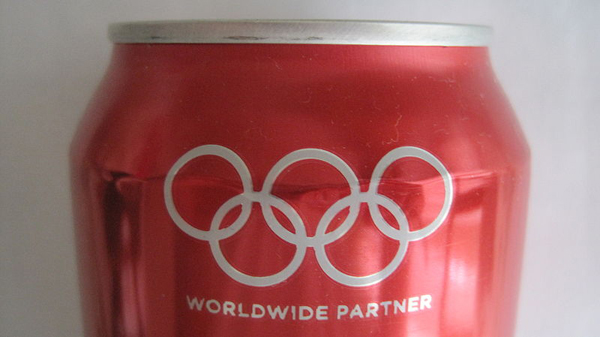
So I like the Olympics. Not like I wait for it all year, but I enjoy the spectacle, fresh-faced athletes, international competition, and an excuse to watch TV with friends. I also enjoy, from a nerd perspective, trivia in the making such as this being the first year that all attending countries have had female athletes on their teams or wondering what Muslim athletes are doing during Ramadan. I’m also fascinated by what I can and can’t see Olympicswise, versus my friends in other countries. Anyone who wants to watch stuff the normal way will have no problem though I do suggest the Easy Read version of the London 2012 site because it’s more straightforward and has less cruft.
So if you’ve been following along, you know that there was a big social media aspect to the opening ceremonies, which had some live tweeting which was already ancient in internet-time by the time the show was broadcast in the US. There was also some controversy concerning some parts of the opening ceremony that were edited out of the US broadcast. I have been sitting at home healing from a sprained ankle so I have been a little more immersed in the meta-story than I might be otherwise.
Anyhow, in my sometimes-role as the internet’s librarian, the question I’ve been seeing a lot is “How do I watch an Olympic thing when I can’t because of $_REASONS?” Now that reason may be because you’re in the US and so you can’t stream the BBC, or because you’re in an African country and don’t have cable, or in the US and allergic to Bob Costas.
It’s not super clear how to do some of these things, and less clear how much end-running these things is problematically extralegal. I will not be addressing the second part, you can consult your own moral compass for that. In any case, I’ve made a little guide which I’ll be updating which help answer some of these questions. The BBC even made two versions of their Opening Ceremonies coverage available, one with the BBC commentary and one without. For people who only saw the goofy NBC version of the ceremony, this English guide to the ceremony (pdf) may be helpful as well as this songlist. Note: I’m linking to MetaFilter, my employer, both because I feel like this sort of international social discussion can be helpful during times like this and because I feel that the information has been the most helpful to me personally. I have no other affiliations with the things I linked to. If there are other things you’ve found, please drop them in the comments.
Also notably: I haven’t said anything about bit torrent because I have not-that-fast broadband and I don’t use it much, but most recorded Olympic events are available for download from the usual places.
Jessamyn’s Guide on How to Watch the Olympics
A few relevant Ask MetaFilter threads
http://ask.metafilter.com/220992/This-is-the-Internet-age-is-it-not
3 Comments on a librarian’s guide to watching the Olympics, last added: 7/31/2012
It was a rumor that I enjoyed, but never one that I thought would actually come true. There was no way it would actually happen. No way way it was true. NO WAY.
And then, it did happen. It WAS true.
On Friday night, a 100 foot tall Voldemort was taken down by a team of Mary Poppins. And it wasn't just Voldemort. Cruella de Vil, Captain Hook, the Queen of Hearts, and the Child Catcher from Chitty Chitty Bang Bang.
Not only did the Olympics celebrate Children's Literature, it celebrated its villains and nightmares.
It's an interesting juxtaposition to the common cries of "WAH! YA lit is too dark!"
The Opening ceremonies embraced that darkness and celebrated it, and for an even younger audience.
I immediately thought of an article I read many years ago, many years before I worked in children's literature. In her December, 2000 Salon piece "Oz vs. Narnia," Laura Miller compares the two beloved classics, with Narnia being the clear winner. And one of the reasons it is the clear winner is because of the darkness. At the time, I thought the comparison didn't work-- one was written for Victorian children on the plains, one was written for British children who just survived the Blitz, of course Narnia is darker. But, I now know differently. I know the debate. I know the literature and this argument still resonates, 12 years later:
[Oz scholar] Hearn complains that American librarians have unjustly labeled Baum’s Oz books as “poorly written”; the librarians, however, are right. He attributes their preference for British fantasy to “Anglocentric” “reverse snobbism,” but the truth is that in Britain real writers like Lewis (and J.R.R. Tolkien, and J.K. Rowling and Phillip Pullman today) write children’s fantasy, and they take their readers seriously, as people facing a difficult and often confusing world.
...
Just as the British think that children are important enough to merit the work of their best writers, British children’s writers think children are important enough to be treated as moral beings. That means that sometimes things get scary.
...
Baum, like many Americans today, saw children differently, as pure innocents who need to be shielded for as long as possible from the challenges of life.
And this debate still rages. Children and teens much be protected from nightmares, and reality. librarian Josh Westbrook says, "Kids are living stories every day that we wouldn't let them read."
But on Friday night, on a global stage, some of literature's most memorable and terrifying villans came out to play. We didn't frolic with puppies, Peter Pan, Alice, a flying car, or even Harry. We didn't immerse ourselves in Neverland, Wonderland, or Hogwarts. No, we recognized and reveled in their enemies. We recognized the nightmares they've given us. But, instead of ignoring they exist, instead of covering our eyes and turning away, Danny Boyle and the London Olympics paraded them out for us all to see. They were celebrated.
In the US, we gnash our teeth and wail and moan about books that portray the darker, harsher sides of our world. In the UK, they take center stage when the entire world is watching.
The prominence they were given, and the seriousness with which they were treated, surprised and delighted me even more than the Queen parachuting in with James Bond or the obligatory singing of "Hey Jude."
And, in the end, I'm still smiling with glee over the fact that the rumor of a Voldemort/Mary Poppins smackdown in the middle of the Opening Ceremonies actually happened, and was completely awesome.

By:
Heidi MacDonald,
on 7/29/2012
Blog:
PW -The Beat
(
Login to Add to MyJacketFlap)
JacketFlap tags:
History,
james bond,
Culture,
olympics,
jk rowling,
jrr tolkien,
danny boyle,
arthurian legends,
glastonbury,
industrialization,
czech rubber boots,
isumbard kingdom brunel,
noel fielding,
opening ceremont,
the white goddess,
voldemort vs poppins,
Add a tag
Friday’s Olympic Opening Ceremony was perhaps the most deliriously audacious live spectacle of the Internet age. Devised by the Anglo-Irish Danny Boyle, it celebrated the uniquely English heritage of industrialization, socialized medicine, drug-inspired music trends, James Bond and fantasy literature. God, how did I even write that sentence? Anyway, it was a night of both triumph and tragedy for nerds—while the geek-friendly moments of the ceremony were copious and unashamed, there was still Twitter outrage over a rumored appearance by Doctor Who somehow being cut for time. As I tweeted at the time, this was somehow nerd privilege overrun. As some anxiously pointed out, there was a “Doctor Who Tardis sound” at the end of the pop music/social media segment, but that was not quite enough to drown out the other supremely nerd-centric moments that were viewed by a billion people worldwide:
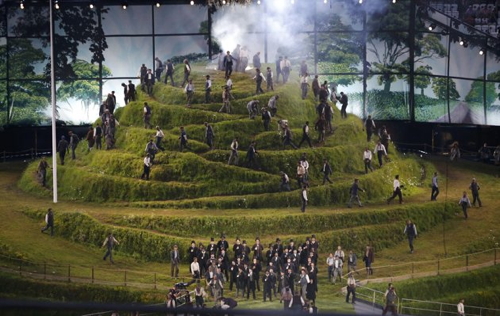
Glastonbury Tor is a place renowned in Christian and pagan mythology and figures prominently in both Celtic and Arthurian lore. Its central place in the Olympic festivities gives it an even more modern allusions. The sacred tree around which the national flags are planted goes back to pagan tree lore. Go read The White Goddess if you need any more explanation.
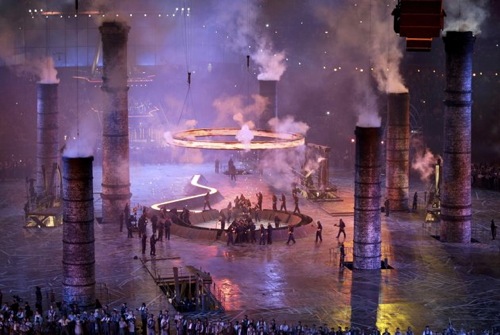
The whole forging of the ring sequence — surrounded by belching smokestack towers — was overtly Tolkienian, even if it didn’t directly reference the professor. It echoes the “Scouring of Shire” chapter of Lord of the Rings—Tolkien’s own allegory of the destruction of agrarian Britain by the advent of industrialization— while the visuals seem to reference Peter Jackson’s take on Isengard. I would say there is also some Wagnerian/Norse Das Rheingold in there, but best not to bring up Germanic lore here.
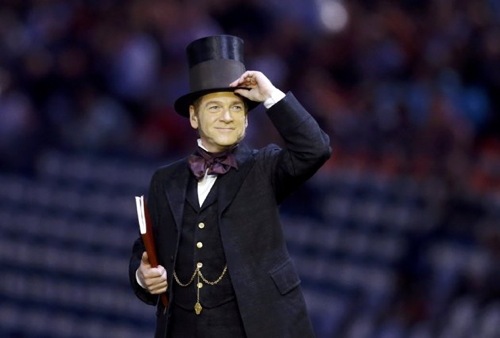
Kenneth Brannagh appeared as Isambard Kingdom Brunel, a cigar chomping engineer and architect, who designed railway grades and bridges. While he lived before the internet, Brunel seems the kind of guy who would today play D&D as an undergrad; he also designed the “train shed” where the Bristol Comic-Con is held.
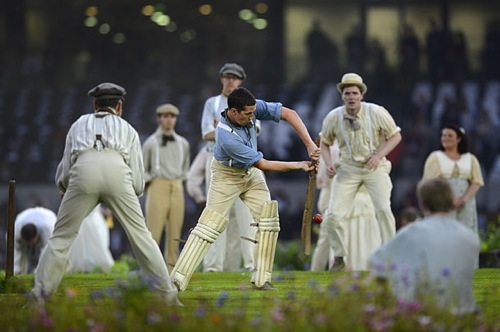
 Today's post is written by Donna Freitas, author of Gold Medal Summer.
Today's post is written by Donna Freitas, author of Gold Medal Summer.
In Gold Medal Summer, Joey Jordan's best events are Beam and Floor. In order to fulfill her dream of winning gold, Joey has to find routines on both events that play to her strengths, not just what her coach values, and that means valuing artistry over tumbling, at times.
And here is a confession: back when I was a competitive gymnast, those were my best (and favorite) events too. My body is long and lean, and so are my muscles, and those events showed off my strengths: flexibility and grace. So I’m partial to gymnasts who can  dance. More than pure strength and power, I look for those pointed toes, beautiful lines, and poise, too. It’s not that the more artistic gymnasts aren’t powerful, but I think their power comes from a certain kind of fearlessness, especially on the beam.
dance. More than pure strength and power, I look for those pointed toes, beautiful lines, and poise, too. It’s not that the more artistic gymnasts aren’t powerful, but I think their power comes from a certain kind of fearlessness, especially on the beam.
Read Chapter 1 of Gold Medal Summer, and read on the find out more about the 2012 U.S.A. Women's Olympic Gymnastics Team.
Of the five young women on this summer’s U.S. Women’s Olympic team, I’m partial to Gabby Douglas on just about every event. It’s difficult to take your eyes off her when she’s competing, especially on Floor and Beam. I think Kyla Ross has great potential too. In my mind, if Joey Jordan took after one of our five Olympic hopefuls, I think it would be Gabby or Kyla.
Here’s the list of girls on the U.S. A. Women’s Gymnastics team competing for the gold medal. The qualification round starts Sunday night, and the team final competition will be on Tuesday, July 31:
- Gabby Douglas
- McKayla Maroney
- Aly Raisman
- Kyla Ross
- Jordyn Wieber
- Sarah Finnegan (alternate)
- Anna Li (alternate)
- Elizabeth Price (alternate)
Don’t forget to keep an eye out for Gabby and Kyla!
If you could win gold, as Joey Jordan so desires in Gold Medal Summer, on which event would you most love to take first?
—Donna Freitas, Author of Gold Medal Summer





 Fresh from winning a gold medal at London 2012, Olympian Alex Morgan has landed a 3-book deal with Simon & Schuster’s Books for Young Readers (SBYR). The American soccer star will be penning her debut middle-grade series, The Kicks.
Fresh from winning a gold medal at London 2012, Olympian Alex Morgan has landed a 3-book deal with Simon & Schuster’s Books for Young Readers (SBYR). The American soccer star will be penning her debut middle-grade series, The Kicks.



















Joan, this is so funny - and the best explanation I've seen of the 'Choose your battles wisely' rule! Fab stuff x
You had me with you there, Joan, right to the end! Brilliant!
Loved this post - v funny!
This is so funny! Nothing beats a great pun!
Brilliant! Love it!
LOL, Joan! And to get from the Olympics to that deserves at least a silver - but I'm so thankful for some diversion from the Olympics that I insist on gold.
Loved it!
Loved it!
Hi
Brilliant. Had to +1 it on Blogger. Great fun.
Thank you all!
Nice one Joan!
Hee, nice one! Awesome!